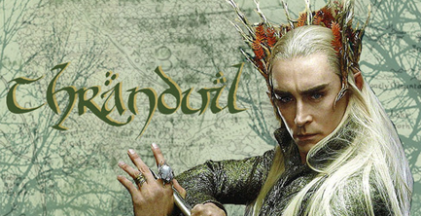Thranduil, also known as the Elvenking, was a Sindarin elf, King of the Woodland Realm, and father of Legolas. Because of Bilbo’s exploits and tales, Thranduil is perhaps the most well-known of the Elvenkings among non-elves. He was the leader of the wood-elves ofNorthern Mirkwood for more than three thousand years in Middle-earth, seeing his realm through attacks by the great spiders and the orcs. Thranduil was known for disliking the dwarves, a trait common among many of his kind.
First and Second Ages
Thranduil was the only son of Oropher. He was born sometime during the end of the First Age and lived in Doriath with Thingol and Melian. At the beginning of the Second Age, Thranduil lived in Lindon with Gil-galad while his father lived in Greenwood. After Oropher died in the war of Last Alliance, Thranduil went east to claim his inheritance and sometime before TA 1000 he established a kingdom in Greenwood the Great.
Third Age
When Thorin Oakenshield and his party of Dwarvesentered northernMirkwood, they were captured by Thranduil’s guards and locked up when they refused to divulge their intentions. It was revealed that Thranduil had a quarrel with Dwarves over some jewels, possibly referring to the First Age murder in Doriath of the Elf kingThingol and the theft of his Silmaril.
After the death of the dragon Smaug, Thranduil supported Bard the Bowman’s claim of a share of the treasure the Dwarves recovered from the Lonely Mountain (Erebor), since Bard was a descendent of LordGirion of Dale, and the treasure of that town had been taken by Smaug to Erebor.
Thranduil led the elven forces in the Battle of the Five Armies, and during the War of the Ring he repulsed an attack from Dol Guldur. His actions were in concert with the Dwarves and the Men of Dale against the Easterlingswho attacked from the East.
Thranduil sent his son Legolas in Rivendell, along with other Elves to report Gollum’s escape in Mirkwood. The gradually-established friendship between the Dwarf Gimli and Legolas later helped to reconcile Thranduil’s people with the Dwarves.
Fourth Age
After the fall of Sauron, Thranduil fixed the southern boundary of his realm as theMountains of Mirkwood, and the Woodland Realm flourished well into the Fourth Age. He may have stayed on as the king of the Great Forest or left Middle-earth.
